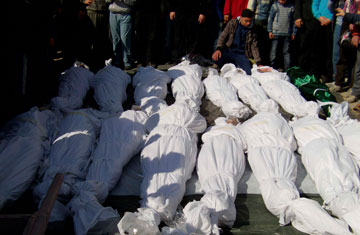
A burial ceremony in the Khaldiyeh neighborhood in the Syrian city of Homs on Feb. 4, 2012, for what activists say are victims of the killings by the Syrian army
The dozens of bodies, cloaked and tightly bound in white shrouds, were hoisted aloft on stretchers, one after the other, after mass funeral prayers in Freedom Square in the Homs neighborhood of Khaldiyeh. Footage aired live by al-Jazeera satellite channel showed women ululating from balconies as the dead were ferried through the streets below on a sunny Saturday afternoon toward the cemetery.
On Friday night and early Saturday morning, while much of the world slept, Syrian security forces carried out what the opposition Syrian National Council (SNC) called a "horrific massacre" targeting Homs' Khaldiyeh and Qusoor neighborhoods, one of the worst in the 11-month uprising. Various activist groups offered differing figures, but somewhere between 217 to perhaps as many as 337 people were killed in Syria's third largest city in a barrage of mortar fire and artillery. More than 1,000 were injured.
Syrian President Bashar Assad appears to have gone "Hama" on Homs, emulating his father and predecessor Hafez Assad's ferocious crackdown on the Syrian city of Hama almost 30 years ago to the day, which left at least 10,000 dead and a trauma so enduring that for decades it crushed all who would question the absolute authority of the Assads.
The bloodbath came on the eve of a U.N. Security Council vote on a draft resolution backing the Arab League's call for Assad to step aside. On Saturday, Russia and China vetoed a watered-down resolution, shielding their stalwart ally from censure. Moscow had gutted most of the substance of the resolution anyway, including calls for Assad's ouster and the imposition of sanctions on his regime.
Damascus denied claims of an assault on Homs. The state-run news agency SANA quoted an unnamed "information source" saying that the allegation was part of a "hysterical campaign of provocation and incitement to the shedding of more Syrian blood" undertaken by "the TV satellites of instigation, partners with the armed terrorist groups and the so-called Istanbul Council" — referring to Qatar and its al-Jazeera channel, Saudi Arabia and al-Arabiya, as well as the SNC, the umbrella group at the forefront of the Syrian opposition.
The gruesome amateur footage of bloodied corpses posted online and "aired by satellites of lies" did not show victims of a government assault, SANA asserted, but rather people kidnapped and killed by "armed terrorist groups." The alleged disinformation was part of "a sinister bid to negatively affect the ongoing U.N. Security Council discussions about Syria," state media said.
The SNC had earlier urged Russia in a statement to reverse its policy and "clearly condemn the regime and hold it responsible for the massacres." SNC chief Burhan Ghalioun also asked "people of the world" to demonstrate in front of Syrian embassies in support of the Syrian people. His call was heeded in several capitals with protests and, in some cases, the storming of embassies in Egypt, the United Arab Emirates, Kuwait, Libya, Algeria, the U.K. and Greece, as well as gatherings outside the U.N. in New York City by pro- and anti-Syrian government supporters.
U.S. President Barack Obama on Saturday condemned the "unspeakable assault" on civilians in Syria. British Foreign Minister William Hague criticized the "chilling" violence in Homs and Assad's "cold-blooded cynicism." Tunisia, the birthplace of the Arab Spring, expelled the Syrian ambassador in Tunis. Russian Foreign Minister Sergei Lavrov said that he would be visiting Syria in the next few days, perhaps with a stronger private message for the Syrian leader that Moscow is unwilling to utter in public.
The people of Homs also had a message for the world as they buried their dead on Saturday. As has become the norm, the funeral in Khaldiyeh quickly turned into a demonstration. "This is a message to Arab leaders, to Russia and China, to the Russian and Chinese people, the United Nations Security Council, you are all partners in the biggest massacre in the uprising!" a young man leading the chants in Khaldiyeh's square yelled into a microphone.
